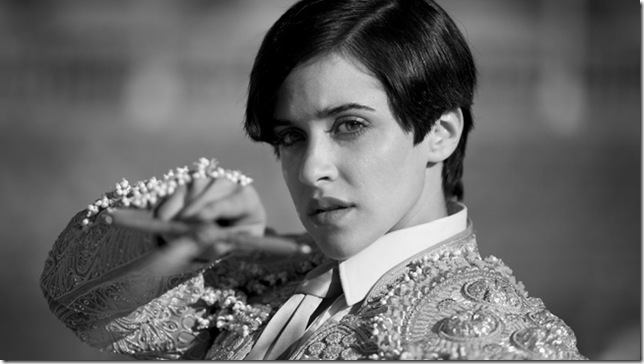Pablo Berger’s Blancanieves is an art-house trifecta: It’s black-and-white, foreign, and silent, triple the insurance that it will alienate the “average moviegoer.” Which is a shame, because the film, which rescues Snow White from its Disneyfied associations and restores to its Grimm foundations, is filled with exactly the kind of escapist excitement and pure imagination that has fueled the Hollywood dream factory for a century.
Blancanieves is set in 1920s Seville, and for the first 40 minutes or so, the Snow White connection is elusive. Antonio Villalta, a master bullfighter, is gored in the ring, triggering a string of events that leads him paralyzed and his wife dead, just after giving birth to a baby that Antonio, in his current incoherent condition, does not want. Encarna (Maribel Verdu), a scheming nurse at Antonio’s hospital, seduces the wheelchair-bound matador for his money, sequestering him in an upstairs room in her manse which the infant – who will grow up to be Snow White – is forbidden from entering.
At this point, the story’s wheels of familiarity are starting to turn, with Verdu’s malicious, black-clothed witch assuming the role of the evil queen. Only this time, instead of initiating rhyming couplets into a mirror, she expresses her vanity by organizing magazine shoots in her home, demanding that she be on the cover. Instead, the now teenaged, androgynous Snow White (played by Sofia Oria; time moves bracingly fast in Blancanieves), having survived a deadly attack from queen’s huntsman, has taken refuge with a clan of seven bullfighting dwarves, and it’s her story that has usurped the queen’s in her glossy magazine.
In a 2012 interview, Canada’s Guy Maddin, one of the few modern-day silent filmmakers, described the audience experience of watching silent movies as “just like riding a bicycle” – we quickly get reaccustomed to its rhythms and textures and, as The Artist asserted in 2011, we can be just as rapt by its stories as the talkiest David Mamet adaptation.
Words are a luxury that is not necessary when the drama is as elemental as Blancanieves’, or the direction as visionary as Berger’s. This is a film rooted in the style of another era, reveling in the very origins of film grammar: There are moody high-angle shots, intoxicating point-of-view plunges into characters’ headspaces, primitive superimpositions a la The Gold Rush, shocking associative montages recalling Eisenstein and the early Russian experimentalists, iris shots of which Griffith was so fond, and penetrating extreme close-ups that conjure Dreyer’s silent masterpiece The Passion of Joan of Arc. (It goes without saying that the movie was shot in the classic, 1:33:1 square aspect ratio.)
Par for the Grimm course, much of life is grotesque in the film’s universe and polarized color palette, where the whites may be virginal but the blacks are rotten to the core. Berger’s strength lies in merging cinematic beauty with narrative disgust; his compositions are gorgeous, and the hot-blooded, melodramatic scenes are presented with a soundtrack of percussive handclaps and lovely Latin guitar that provide abstract character without editorializing. I wouldn’t be surprised if Alfonso de Vilallonga’s musical score is remembered as one of the year’s best.
Despite its dogged roadblocks to modern conventions, Blancanieves is not a dense, art-house ramble; it’s a bona fide audience movie. If there is any criticism to be leveled at the film, it’s the sense of going through the motions that is inherent in just about any transplanted retelling of an iconic text. After a while, even I started to check my watch, waiting for the inevitable poison apple. The film is never more enchanting than its opening third, which is anchored by the pleasure of not knowing what’s coming next. I’d love to see Berger take on a wholly original silent-film project with which to flex his creative muscles.
BLANCANIEVES. Director: Pablo Berger; Cast: Sofia Oria, Maribel Verdu, Daniel Gimenez Cacho, Inma Cuesta, Angela Molina, Macarena Garcia; Distributor: Cohen Media Group; Rating: PG-13; Opens: Friday at Regal Delray 18, Movies of Delray, Movies of Lake Worth, Regal Shadowood 16 in Boca Raton, Frank Theaters Sunrise 11 in Sunrise, and the Coral Gables Art Cinema.
